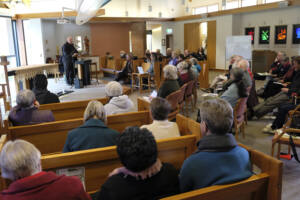
WelCom August 2024
Bernie Kernot
Public debate around Te Tiriti o Waitangi has provoked a strong Catholic response.
Under the auspices of the Ko Te Tiriti Mai rāno: The Treaty Is Always Speaking. A Covenant for the Generations hui,nearly 70 people gathered at the Home of Compassion in Island Bay over a weekend in July, to consider Te Tiriti in its religious dimensions.
As History Professor Jim McAloon pointed out in his address, missionaries – both Catholic and Protestant – participated actively in the proceedings surrounding its signing; and Anglican theologian, Rev Dr Rangi Nicholson, told the hui he believed it was the trust relationship between rangatira and the missionaries that was instrumental in realising the Treaty relationship.
Professor McAloon referred to principles imbedded in Catholic social teaching applicable in Te Tiriti discourse. These included principles of human dignity, the common good, subsidiarity, participation, distributive justice, and stewardship. He asked the hui to consider what Te Tiriti means for us as a people of faith, and whether faith helps in thinking about the past and future of our country.
Dr Nicholson developed the covenant theme, observing that the nature of covenant lies in its sacral element that Māori have incorporated into their world view. That contrasts with the secular view of Te Tiriti as a contract.
Principles imbedded in Catholic social teaching are applicable in Te Tiriti discourse, including human dignity, the common good, subsidiarity, participation, distributive justice, and stewardship.
Coming from the public sector where he has extensive experience in implementing Te Tiriti objectives, Paora Ammunson, Deputy Chief Executive, Treaty Outcomes, at Te Pukenga, presented a challenging vision of what a bicultural Church might look like. Noting that ‘synod’ meant ‘walking together’ he asked how well the archdiocese practised synodality with its Treaty partner.
One session of the hui was a practical exercise in the pronunciation and use of te reo in prayers and hymns. Participants represented many ethnicities, and entered enthusiastically into the spirit of the exercise, guided by Matheison Ammunson-Fyall of Wellington South Parish.
Participants broke into small groups after each presentation to consider and discern questions posed by the speakers. The discussion groups followed the synodal method that allowed each participant space to express their personal thoughts, feelings, fears, hopes or objections in a respectful and non-confrontational environment. Facilitators guided the groups through the process and reported their group’s discussion at plenary sessions. These reports are being collated, and summaries will be sent to all registered participants, to ensure the work of the hui will continue to have a life.
Some overall insights emerging from the groups include:
- listening to mana whenua in building authentic relationships;
- the need for greater awareness of Te Tiriti, reconciliation where breaches have occurred, and better education;
- integration of Māori perspectives and values in church practices;
- importance of the whole Church taking a systematic and proactive approach to fostering unity, advocating for social justice, and addressing societal challenges.
The sponsoring organisations, the Christian Life Community and the Bicultural Committee of the Archdiocesan Commission for Ecology, Justice, and Peace, are working to have all presentations from the hui available online. Please email d.meskill@wn-catholicsocialservices.org.nz if you would like a link to the presentations.
Bernie Kernot is a retired academic, a former chair of the archdiocesan Commission for Justice, Peace and Development (now Commission for Ecology, Justice and Peace), and a member of the Christian Life Community.